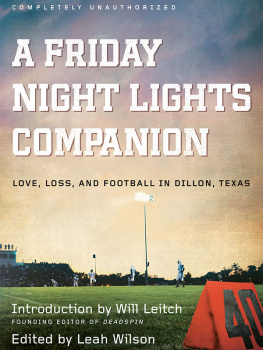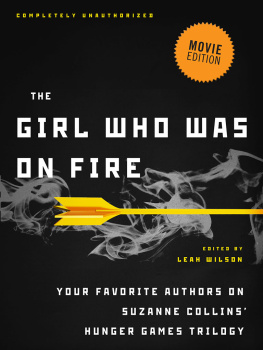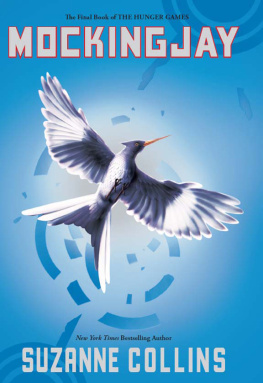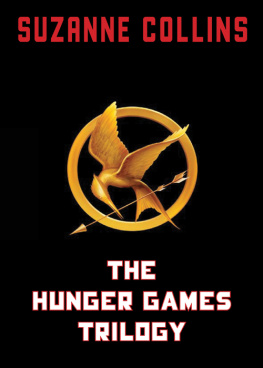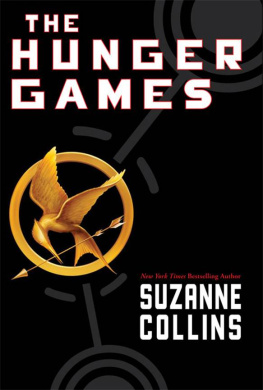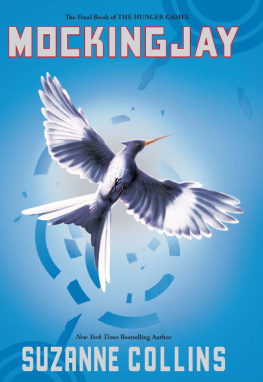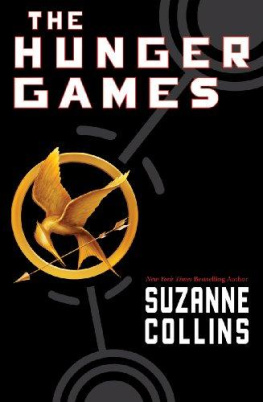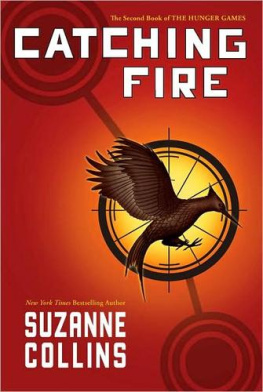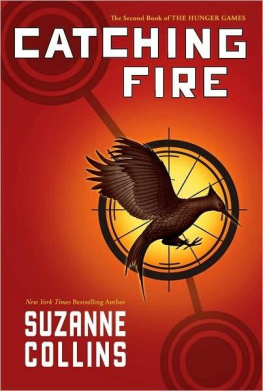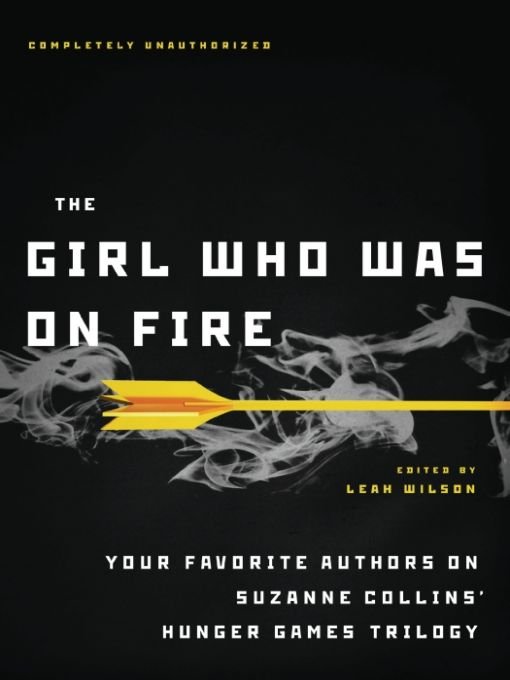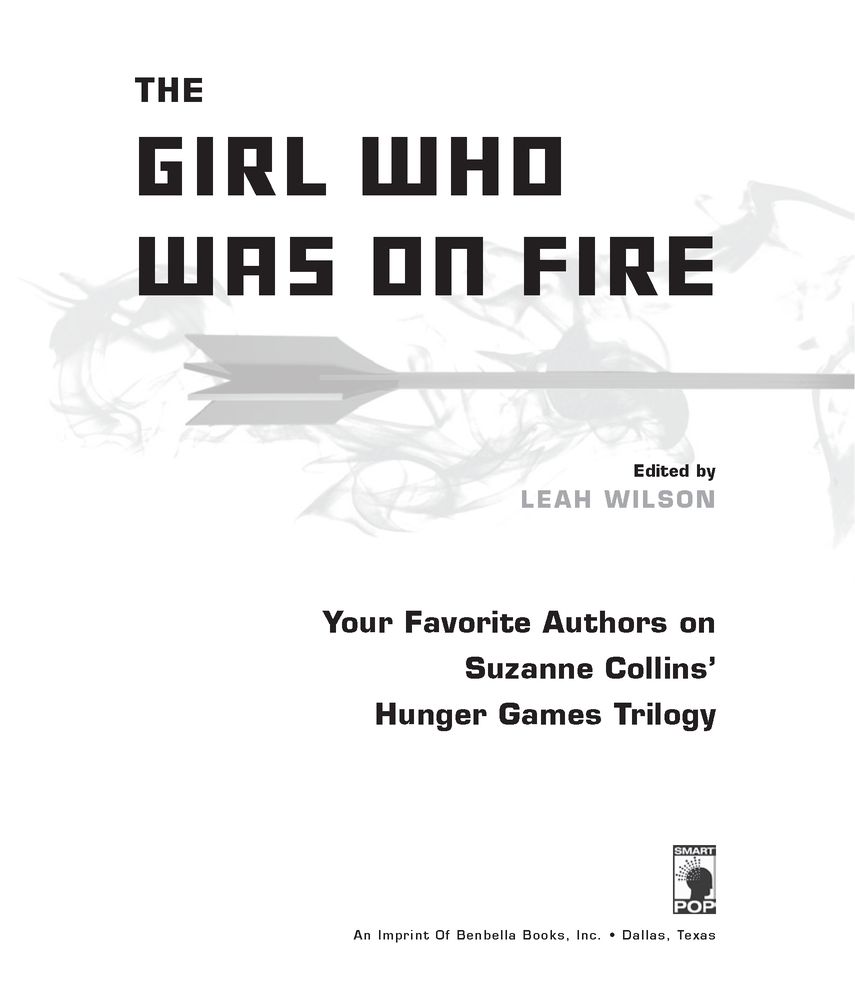Table of Contents
OTHER YA SMART POP TITLES
Demigods and Monsters
on Rick Riordans Percy Jackson and the Olympians Series
A New Dawn
on Stephenie Meyers Twilight Series
Secrets of the Dragon Riders
on Christopher Paolinis Inheritance Saga
Mind-Rain
on Scott Westerfelds Uglies Series
Flirtin with the Monster
on Ellen Hopkins Crank and Glass
A Visitors Guide to Mystic Falls
on The Vampire Diaries
Through the Wardrobe
on C.S. Lewis Chronicles of Narnia
Nyx in the House of Night
on P.C. and Kristin Casts House of Night series
(coming summer 2011)
INTRODUCTION
You could call the Hunger Games a series that islike its heroineon fire. But its popularity, in itself, is nothing new. We live in an era of blockbuster young adult book series: Harry Potter, Twilight, now the Hunger Games. Its more unusual these days for there not to be a YA series sweeping the nation.
All of these series have certain things in common: compelling characters; complex worlds you want to spend time exploring; a focus on family and community. But the Hunger Games is, by far, the darkest of the three. In Twilight, love conquers all; Bella ends the series bound eternally to Edward and mother to Renesmee, without having to give up her human family or Jacob in the process. In Harry Potter, though there is loss, the world is returned to familiar stability after Voldemorts defeat, and before we leave them, we see all of the main characters happily married, raising the next generation of witches and wizards. In the Hunger Games, while Katniss may conclude the series similarly married and a mother, the ending is much more bittersweet. Her sister and Gale are both lost to her in different but equally insurmountable ways. The world is better than it was, but there are hints that this improvement is only temporarythat the kind of inhumanity we saw in the districts under Capitol rule is the true status quo, and that the current peace is ephemeral, precious, something toward which Panem will always have to struggle.
In other words, the Hunger Games ends in a way that feels surprisingly adultbleak, realistic, as far from wish fulfillment as one can imagine. Such a conclusion only emphasizes something YA readers have known for years: that there is serious, engaging, transformative work going on in YA literature. The Hunger Games is more than Gale versus Peeta; theres so much more at stake in this series than love (and so much more at stake in loving, here, as well). The series takes on themes of power and propaganda, trauma and recovery, war and compassion. Its about not just learning ones power, but learning the limits of ones power as well.
Because at its core, the Hunger Games is a coming-of-age story, and not just for Katnissits a coming-of-age story for Panem, and in a way, for us, its readers, as well. The series pushes us to grow up and take responsibility both personally and politically for our choices: those Capitol residents we see milling through the streets in Mockingjay, the same Capitol residents who so raptly watched the Hunger Games on television year after year without recognizing the suffering that made it possible, are us. Thats a heavy message to take away from any book series, but an important one for all of uswhether we ourselves would be shelved under Young Adult or not.
The pieces youre about to read dont cover everything in the Hunger Games series (they couldnt cover everything), but they do tease out at least a few of the series most thought-provoking ideas. Together, they provide an extended meditation on the series and its world, on Katniss and our response to her, on love and family and sacrifice and survival. But you shouldnt take this to mean the anthology is always as serious as Mockingjay at it heaviest. Theres humor, and warmth, and hope here, too. Each of our contributors has brought his or her own particular interests and expertise to exploring the series, and topics run the gamut from fashion to science to reality television and real-world media training.
Still, youll find these essays tend to return to the same events and the same ideas over and over again. But each time we revisit them our perspective shiftsthe same way reality in the series is constantly shiftingletting us interpret old events, old ideas, in new ways. As each writer passes the torch to the next, our contributors cover new ground while pushing our understanding of the Hunger Games as a whole further, toward a greater awareness of everything these books have to offer.
While editing this anthology, I was alternately surprised, fascinated, and moved to tearsa tribute not only to the Hunger Games series itself but also to the talented YA writers whose work is collected here. And I hope that you, too, will find something fresh to feel or think about in these pagesthat The Girl Who Was on Fire encourages you to debate, question, and experience the Hunger Games in a whole new way.
Leah Wilson
December 2010
WHY SO HUNGRY FOR THE HUNGER GAMES?
Or, the Game of Making Readers Hungry for More, Why Readers Imaginations Caught Fire, and My Sad Inability to Come Up with a Wordplay forMockingjay
SARAH REES BRENNAN
The Hunger Games is, without question, a great series. Millions of readers have stuck with Katniss Everdeen through three books, two rounds of Games, and a warand still cant get enough. If youre reading this book, then none of this is news to you. But what is it about this dystopian story that draws in readers of all ages and genres? Why have these books enraptured a generation? Its no easy question to tackle, but Sarah Rees Brennan suggests some very compelling answers.
As you can tell from all the atrocious puns in the title, this essay will be studying the elements in the Hunger Games trilogy that inspire its tremendous popularity. Its fascinating to analyze the mixture of elements that has caught readers imaginations around the world. What is so alluring about the Hunger Games particular mixture of adventure, romance, and philosophy? Many of the elements present in the series are familiar, so how does Suzanne Collins make it all seem fresh and compelling?
For a long time I avoided the Hunger Games because, well, Id seen Battle Royale, thank you very much. (Battle Royale is a Japanese movie, based on the book of the same name by Koushun Takami, about high school students who are chosen by lottery to kill each other under new legislation introduced by a futuristic government.) I finally buckled under the weight of hearing everybodys enthusiastic recommendations for six months, and then I read the Hunger Games voraciously and was extremely annoyed when interrupted by such inconsequential things as Christmas dinner. (God, Mom, did you not understand Katniss was being pursued by the mutts? You have several children, why does it always have to be about collecting the whole set all the time?)
So my assumption made an ass out of me, and I missed out on the Hunger Games for six months! My reason for avoiding the Hunger Games really was ridiculous, as we all know there are no brand-new plots under the sun: what really matters is the way you tell the stories and the passion you have for them.


